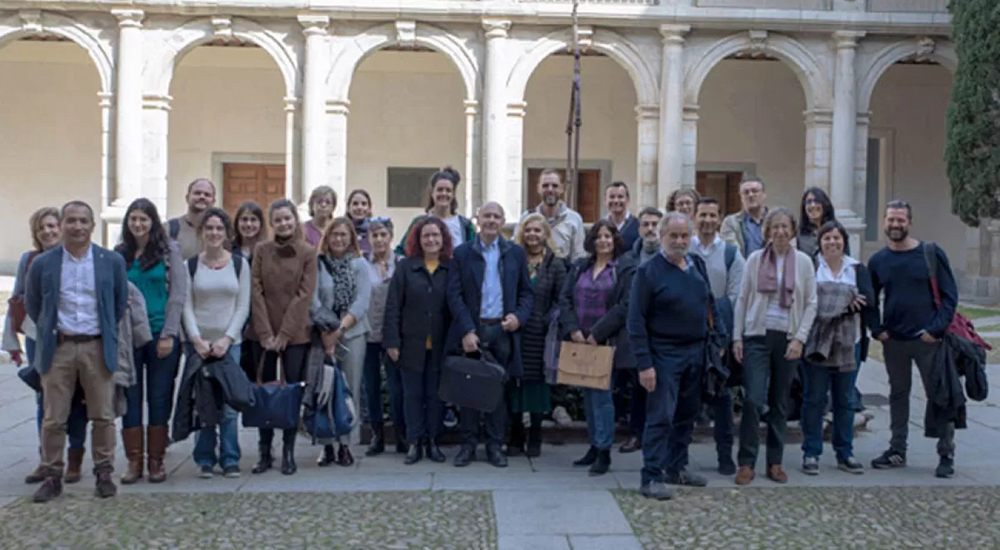- The results, published in the journal Science of The Total Environment, show that Madrid and Barcelona are among the areas with the highest accumulations of these pollutants.
A team of Spanish scientists, belonging to the EnviroPlaNet network and led by the Autonomous University of Madrid (UAM) and the University of Alcalá (UAH), has published an article in the journal Science of The Total Environment in which they analyze the presence of microplastics in the atmosphere and their subsequent deposition in the soil in different Spanish cities.
Among the authors of the study are three researchers from the EOMAR group of the ECOAQUA Institute of the University of Las Palmas de Gran Canaria (ULPGC): May Gómez Cabrera, professor of Zoology and head of EOMAR; as well as the researchers Alicia Herrera Ulibarri and Ico Martínez Sánchez.
 Photo of EOMAR researchers: From left to right: May Gómez, Ico Martínez and Alicia Herrera.
Photo of EOMAR researchers: From left to right: May Gómez, Ico Martínez and Alicia Herrera.
Microplastics are tiny plastic particles measuring less than 5 millimeters that originate from the degradation of plastic materials discarded in the environment. These pollutants are considered ubiquitous, as they have been found in all terrestrial and marine ecosystems. However, until now, not much research has been done on their presence in the atmosphere and their impact on soil.
This study simultaneously monitored for one year the atmospheric deposition of microplastics in ten different urban areas in mainland Spain and the Canary Islands, each with different population sizes, economic activities and climates. According to the results, Madrid and Barcelona lead in the highest accumulation of these pollutants, while Las Palmas de Gran Canaria is in fifth place, mid-table, and Santa Cruz de Tenerife is among the areas with the lowest rate of microplastic deposition studied, in eighth position.
 The numbers on the map correspond to the locality (10 for Las Palmas de Gran Canaria and 9 for Santa Cruz de Tenerife).
The numbers on the map correspond to the locality (10 for Las Palmas de Gran Canaria and 9 for Santa Cruz de Tenerife).
The research results explain that polyester fibers are the most common microplastics, followed by acrylic polymers, polypropylene and alkyd resins.
In this work, the researchers of the ECOAQUA Institute contributed their experience in the analysis of microplastics, not only on land, but also in the marine environment, as well as in the study of the biological and ecological effects of these pollutants on aquatic organisms.
In their conclusions, they warn that microplastics can have negative effects on both the environment and human health, as they can carry associated chemical pollutants. Therefore, they recommend improving the management of plastic waste and reducing its consumption, especially that of single-use plastics.
The study is part of the EnviroPlaNet Network, a network of excellence funded by the Ministry of Science and Innovation, which brings together 14 Spanish research centers dedicated to the study of microplastics in the environment.
The study led by the Autonomous University of Madrid and the University of Alcalá, has been supported by two public universities of the Canary Islands, the University of Las Palmas de Gran Canaria (ULPGC), through ECOAQUA, and the University of La Laguna (ULL), and with the collaboration of other national and international institutions, such as the National Institute for Aerospace Technology (INTA), the National Center for Biotechnology (CNB-CSIC), the University of Córdoba (UCO), the University of Santiago de Compostela (USC), the Polytechnic University of Valencia (UPV), The University of the Basque Country (UPV/EHU), the University of Granada (UGR), the Polytechnic University of Madrid (UPM), the Mediterranean Institute for Advanced Studies (IMEDEA-CSIC/UIB), the Pyrenean Institute of Ecology (IPE-CSIC), the Catalan Institute for Water Research (ICRA) and the Swiss Federal Institute for Water Science and Technology (EAWAG).
The article is available at the following link: https://www.sciencedirect.com/science/article/abs/pii/S0048969723055481#ab0005
Bibliographic reference: Edo, C.; Fernández-Piñas, F.; Leganes, F.; Gómez, M.; Martínez, I.; Herrera, A.; ... González-Pleiter, M. (2023). A nationwide monitoring of atmospheric microplastic deposition. Science of The Total Environment, 905, 166923.
Doi : 10.1016/j.scitotenv.2023.166923.
Press office: Beatriz Díaz – beatriz@mandarinacomunicacion.es - 620410871


